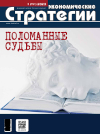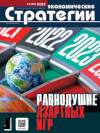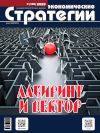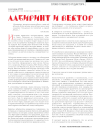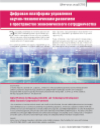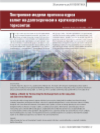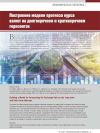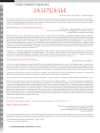Author page: Alexander Ageev
Double Bottom of the Future
DOI: 10.33917/es-6.192.2023.5
Broken Destinies
Indifference of Gambling
Agitated Zero
Labyrinth and Vector
Digital Platform for Managing Scientific and Technological Development within Economic Cooperation Framework
DOI: 10.33917/es-1.187.2023.56-69
In the circumstances of sanctions-related economic and scientific-technical blockade, the need to build digital mechanisms for managing import substitution processes on the basis of planning and coordinating competencies, similar to the competencies that the USSR State Committee for Science and Technology had, has sharply actualized. It is proposed to use intelligent digital platforms to control the development of science and technology based on the principles of the Soviet information network OGAS and EGSVC projects. The authors of the article substantiate necessity to apply digital information and communication technologies and computing services at various levels of management for innovative agents of any form of ownership through creating and configurating multilayer information-management fields.
References:
1. Ageev A.I., Loginov E.L. Mirovoe soobshchestvo v usloviyakh sverkhkriticheskoi bifurkatsii [The World Community in the Conditions of Supercritical Bifurcation]. Upravlenie slozhnymi organizatsionnymi i tekhnicheskimi sistemami v usloviyakh sverkhkriticheskikh situatsii: Materialy mezhdunarodnoi nauchno-prakticheskoi konferentsii. Moskva, MNIIPU, 21–22 aprelya 2022 g. [Management of Complex Organizational and Technical Systems in Conditions of Supercritical Situations: Proceedings of the International Scientific and Practical Conference. Moscow, MNIIPU, April 21–22, 2022]. Moscow, INES, 2022, pp. 9–12.
2. Ageev A.I., Loginov E.L. Rossiya v novoi ekonomicheskoi real’nosti [Russia in a New Economic Reality]. Moscow, Institut ekonomicheskikh strategii, Assotsiatsiya “Analitika”, 2016, 460 p.
3. Grabchak E.P. Importozameshchenie v energetike Rossii v usloviyakh sanktsii [Import Substitution in the Russian Energy Sector in the Context of Sanctions]. Upravlenie slozhnymi organizatsionnymi i tekhnicheskimi sistemami v usloviyakh sverkhkriticheskikh situatsii: Materialy mezhdunarodnoi nauchno-prakticheskoi konferentsii. Moskva, MNIIPU, 21–22 aprelya 2022 g. [Management of complex organizational and technical systems in conditions of supercritical situations: Proceedings of the international scientific and practical conference. Moscow, MNIIPU, April 21–22, 2022]. Moscow, MNIIPU, 2022, pp. 16–18.
4. Grabchak E.P., Loginov E.L., Chinaliev V.U., Epishkin I.I. Upravlenie razvitiem slozhnykh nauchno-tekhnicheskikh kompleksov na osnove intellektual’nykh tsifrovykh platform (realizatsiya kompetentsii Goskomiteta SSSR po nauke i tekhnike v usloviyakh tsifrovoi ekonomiki) [Managing the Development of Complex Scientific-technical Systems Based on Intelligent Digital Platforms (Implementation of the Competencies of the USSR State Committee for Science and Technology in Conditions of Digital Economy)]. Moscow, INES, 2023, 504 p.
5. Chinaliev V.U. Razvitie politiki importozameshcheniya v promyshlennosti Rossii [Developing Import Substitution Policy in the Russian industry]. Upravlenie slozhnymi organizatsionnymi i tekhnicheskimi sistemami v usloviyakh sverkhkriticheskikh situatsii: Materialy mezhdunarodnoi nauchno-prakticheskoi konferentsii. Moskva, MNIIPU, 21–22 aprelya 2022 g. [Management of Complex Organizational and Technical Systems in Conditions of Supercritical Situations: Proceedings of the International Scientific and Practical Conference. Moscow, MNIIPU, April 21–22, 2022]. Moscow, MNIIPU, 2022.S. 50–53.
Building a Model for Forecasting the Exchange Rate on the Long-term and Short-term Horizons
DOI: 10.33917/es-1.187.2023.16-25
Forecasting the ruble exchange dynamics appears objectively necessary for shaping both the medium-term financial strategy of industry corporations and the general strategic course for occupying leading positions in sectors of business interest, including through the use of new financial instruments, new markets and, in general, a system of strategic planning of socio-economic development of Russia. However, in today’s realities, according to most experts, with whom we cannot but agree, the task of forecasting seems extremely difficult and appears complicated by the fact that the launched crises are unpredictable and are characterized by a diverse nature (pandemic and geopolitical crises, expansion of trade wars and sanctions). In such conditions, when uncertainty grows excessively, it is important to turn to the accumulated experience: to analyze to what extent the available models can be suitable for prospective assessments in the current environment.
References:
[1–15] see No. 6 (186)/2022, p. 25.16. Ageev A.I., Glaz’ev S.Yu., Mityaev D.A., Zolotareva O.A., Pereslegin S.B. Postroenie modeli prognoza kursa valyut na dolgosrochnom i kratkosrochnom gorizontakh [Building a Model for Forecasting the Exchange Rate on the Long-term and Short-term Horizons]. Ekonomicheskie strategii, 2022, no 6 (186), pp. 16–25, available at: DOI: https://doi.org/10.33917/es-6.186.2022.16-25.
17. Dubrova T.A. Analiz vremennykh dannykh [Time Data Analysis]. Analiz dannykh. Moscow, Yurait, 2019, pp. 397–459.
18. Boks Dzh, Dzhenkins G. Analiz vremennyh ryadov [Time Series Analysis]. Prognozirovanie i upravlenie. Moscow, Mir, 1974, 406 p.
19. Alzheev A.V., Kochkarov R.A. Sravnitel’nyi analiz prognoznykh modelei ARIMA i LSTM na primere aktsii rossiiskikh kompanii [Comparative Analysis of ARIMA and LSTM Forecasting Models on the Example of Russian Companies’ Stocks]. Finansy: teoriya i praktika, 2020, no 24(1), pp. 14–23,
DOI: 10.26794/2587-5671-2020-24-1-14-23.
20. Mhitaryan S.V., Danchenok L.A. Prognozirovanie prodazh s pomoshch’yu adaptivnyh statisticheskih metodov [Sales Forecasting with the Help of Adaptive Statistical Methods]. Fundamental’nye issledovaniya, 2014, no 9-4, pp. 818–822.
21. Pilyugina A.V., Bojko A.A. Ispol’zovanie modelej ARIMA dlya prognozirovaniya valyutnogo kursa [Using ARIMA Models for Exchange Rate Forecasting]. Prikaspijskij zhurnal: upravlenie i vysokie tekhnologii, 2015, no 4, pp. 249-267.
22. Ruppert D., Matteson D.S. Statistics and Data Analysis for Financial Engineering. Springer, 2015, available at: https://link.springer.com/book/10.1007%2F978-1-4939-2614-5.
23. Garcia F., Guijarro F., Moya I., Oliver J. Estimating returns and conditional volatility: A comparison between the ARMA-GARCH-M models and the backpropagation neural network. International Journal of Complex Systems in Science, 2012, no 1(2), pp. 21–26.
24. Maniatis P. Forecasting the Exchange Rate Between Euro And USD: Probabilistic Approach Versus ARIMA And Exponential Smoothing Techniques. Journal of Applied Business Research (JABR), 2012, no 28(2), pp. 171–192, available at: https://doi.org/10.19030/jabr.v28i2.6840.
Building a Model for Forecasting the Exchange Rate on the Long-term and Short-term Horizons
DOI: https://doi.org/10.33917/es-6.186.2022.16-25
Forecasting the ruble exchange dynamics appears objectively necessary for shaping both the medium-term financial strategy of industry corporations and the general strategic course for occupying leading positions in sectors of business interest, including through the use of new financial instruments, new markets and, in general, a system of strategic planning of socio-economic development of Russia. However, in today’s realities, according to most experts, with whom we cannot but agree, the task of forecasting seems extremely difficult and appears complicated by the fact that the launched crises are unpredictable and are characterized by a diverse nature (pandemic and geopolitical crises, expansion of trade wars and sanctions). In such conditions, when uncertainty grows excessively, it is important to turn to the accumulated experience: to analyze to what extent the available models can be suitable for prospective assessments in the current environment.
References:
1. Kuranov G.O. Metodicheskie voprosy kratkosrochnoi otsenki i prognoza makroekonomicheskikh pokazatelei [Methodological Issues of Short-Term Assessment and Forecast of Macroeconomic Indicators]. Voprosy statistiki, 2018, no 25(2), pp. 3–24.
2. Frenkel’ A.A., Volkova N.N., Surkov A.A., Romanyuk E.I. Sravnitel’nyi analiz modifitsirovannykh metodov Greindzhera — Ramanatkhana i Beitsa — Greindzhera dlya postroeniya ob”edinennogo prognoza dinamiki ekonomicheskikh pokazatelei [Comparative Analysis of Modified Granger-Ramanathan and Bates-Granger Methods for Developing a Combined Forecast of Economic Indicators Dynamics]. Voprosy statistiki, 2019, no 26(8), pp. 14–27.
3. Shirov A.A. Makrostrukturnyi analiz i prognozirovanie v sovremennykh usloviyakh razvitiya ekonomiki [Macrostructural Analysis and Forecasting under Current Conditions of Economic Development]. Problemy prognozirovaniya, 2022, no 5, pp. 43–57.
4. Dmitrieva M.V., Suetin S.N. Modelirovanie dinamiki ravnovesnykh valyutnykh kursov [Simulating the Dynamics of Equilibrium Exchange Rates]. Vestnik KIGIT, 2012, no 12–2(30), pp. 061–064.
5. Linkevich E.F. Mirovaya valyutnaya sistema: poliinstrumental’nyi standart [World Monetary System: Polyinstrumental Standard]. Krasnodar, 2014, pp. 82–91.
6. Ageev A.I., Loginov E.L. Izmenenie strategii operirovaniya dollarom: zapusk SShA novogo kreditno-investitsionnogo tsikla vo vzaimosvyazi s valyutnymi voinami [Changing the Strategy of Dollar Handling: US Launch of New Credit-Investment Cycle in Association with the Currency Wars]. Ekonomicheskie strategii, 2015, no 3(129), pp. 20–35.
7. Fedorova E.A., Lazarev M.P. Vliyanie tseny na neft’ na finansovyi rynok Rossii v krizisnyi period [Impact of Oil Prices on the Financial Market of Russia During the Crisis]. Finansy i kredit, 2014, № 20(596), pp. 14–22.
8. Kuz’min A.Yu. Valyutnye kursy: v poiskakh strategicheskogo ravnovesiya [Exchange Rates: in Search of Strategic Equilibrium]. Ekonomicheskie strategii, 2018, no 1, pp. 82–91.
The Wonderland
DOI: https://doi.org/10.33917/es-6.186.2022.4-5


 Alexander I. Ageev
Alexander I. Ageev



